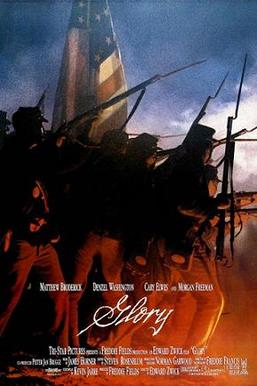Glory (1989)
Glory (1989), an American war film coordinated by Edward Zwick, the film is about the 54th Massachusetts Infantry Regiment which the Union Army's first dark regiment in the American Civil War. The film portrays the warriors of the 54th from the arrangement of their regiment to their courageous activities at the Second Battle of Fort Wagner on July 18, 1863.[1]
Plot
The tale of the 54th Massachusetts Infantry Regiment, told for the most part through the eyes of their leader, Colonel Robert Gould Shaw (played by Matthew Broderick). Shaped during the American Civil War, the 54th Massachusetts was the principal African-American unit in the US Army. |It shows the development of the regiment, its first volunteers, their preparation, questions with chairmen, their first activities in South Carolina and, at last, their snapshot of magnificence - the assault on Fort Wagner.[2]
Controversy
The film fame arose out of its ability to handle agitating issues, for example, the segregation and bigotry that black warriors looked from inside the military and from their own administration.[3] The movie shows how black soldiers are treated differently where black soldiers will only be paid $10, whole the white soldiers are paid $13 per month.[1] For such heroic movies, there are many slurs thrown into the black soldier
As numerous prejudice wild through these depictions, the crowd is informed that the more a character accepts the features of white culture and becomes, in the expressions of Tripp, a "house Negro," the "better" they are. Along these lines, the men of the regiment are not battling simply to free themselves or their families; they are battling for their personhood. By the film's principles however reinforce white supremacy, even though it is shown using the body of a colored person. This again rebuffs dark characters for practicing agency on their own terms, along these lines building up racial domination. This is particularly unsafe in a film intended to exhibit the wrongs of the racial oppressor Confederacy and the valiance of individuals of color battling for opportunity.[4]
Reference
- ↑ 1.0 1.1 https://en.wikipedia.org/wiki/Glory_(1989_film)
- ↑ https://www.imdb.com/title/tt0097441/
- ↑ https://www.theatlantic.com/national/archive/2012/02/how-the-men-of-glory-stood-up-to-the-us-government/253410/
- ↑ https://blogs.mcgill.ca/hist-399-2014/2014/03/20/glory-film-review-by-alex-langer/#_ftnref3
